Design decisions for buildings and communities are critical to efforts to increase local and regional resiliency. Building designers — of residential, institutional, and commercial structures — should strive to incorporate passive and active survivability concepts into new and renovated structures.
Community planners and developers need to incorporate concepts that increase the capacity to maintain transportation flow, strategies to handle water management, and infrastructure approaches that will withstand a variety of risks.

American Resilience Project: Farm Free or Die
“Farm Free or Die,” a film by American Resilience Project, advocates for transformative agricultural policies that improve farming livelihoods and address the climate crisis.
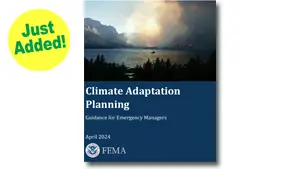
Climate Adaptation Planning: Guidance for Emergency Managers
FEMA’s Climate Adaption Planning: Guidance for Emergency Managers is intended to help state, local, tribal, and territorial (SLTT) emergency managers incorporate climate adaptation into emergency management planning efforts.
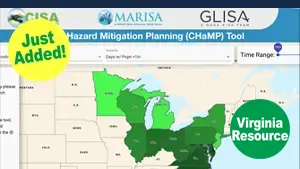
Climate and Hazard Mitigation Planning (CHaMP) Tool
CHaMP provides users with a single point of access to county-, state- and region-specific historical climate and hazard data and projected climate information.
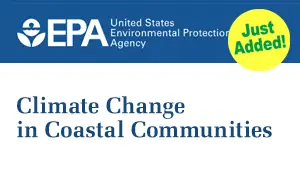
Climate Change in Coastal Communities
US EPA maintains a website that focuses on essential information for coastal communities planning for the effects of climate change.
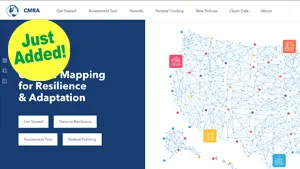
Climate Mapping for Resilience and Adaptation
The U.S. Climate Resilience Toolkit offers a framework to help communities systematically consider and address their climate hazards.
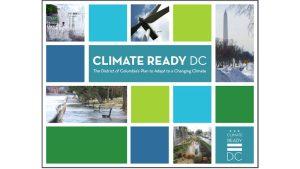
Climate Ready DC: The District of Columbia’s Plan to Adapt to a Changing Climate
Climate Ready DC is the District of Columbia’s strategy to make the District more resilient to future climate change while helping to ensure that our city continues to grow greener, healthier, and more livable.
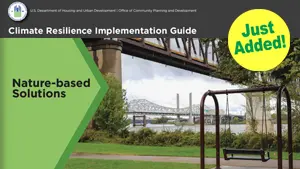
Climate Resilience Implementation Guide: Nature-based Solutions
The Climate Resilience Implementation Guide provides step-by-step instructions to assist communities in implementing nature-based solutions. Grantees are encouraged to use this Guide for suggestions on how to effectively use Community Planning and Development (CPD)-funded programs and other resources to design and implement nature-based solutions.
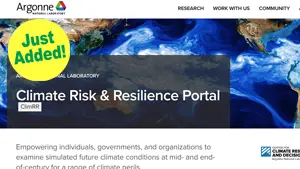
Climate Risk & Resilience Portal (ClimRR)
The Climate Risk & Resilience Portal from Argonne National Laboratory empowers individuals, governments, and organizations to examine simulated future climate conditions at mid- and end-of-century for a range of climate perils.

EPA: Flood Resilience Checklist
Is your community prepared for a possible flood? Use EPA’s Flood Resilience checklist to improve your community’s flood resilience.
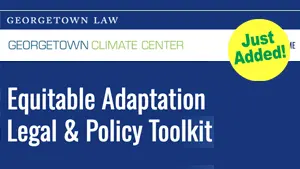
Equitable Adaptation Legal & Policy Toolkit
The Georgetown Climate Center maintains the Equitable Adaptation Legal & Policy Toolkit, which highlights best and emerging practice examples of how cities are addressing disproportionate socioeconomic risk to climate impacts and engaging overburdened communities.

American Resilience Project: Farm Free or Die
“Farm Free or Die,” a film by American Resilience Project, advocates for transformative agricultural policies that improve farming livelihoods and address the climate crisis.

Climate Adaptation Planning: Guidance for Emergency Managers
FEMA’s Climate Adaption Planning: Guidance for Emergency Managers is intended to help state, local, tribal, and territorial (SLTT) emergency managers incorporate climate adaptation into emergency management planning efforts.

Climate and Hazard Mitigation Planning (CHaMP) Tool
CHaMP provides users with a single point of access to county-, state- and region-specific historical climate and hazard data and projected climate information.

Climate Change in Coastal Communities
US EPA maintains a website that focuses on essential information for coastal communities planning for the effects of climate change.

Climate Mapping for Resilience and Adaptation
The U.S. Climate Resilience Toolkit offers a framework to help communities systematically consider and address their climate hazards.

Climate Ready DC: The District of Columbia’s Plan to Adapt to a Changing Climate
Climate Ready DC is the District of Columbia’s strategy to make the District more resilient to future climate change while helping to ensure that our city continues to grow greener, healthier, and more livable.

Climate Resilience Implementation Guide: Nature-based Solutions
The Climate Resilience Implementation Guide provides step-by-step instructions to assist communities in implementing nature-based solutions. Grantees are encouraged to use this Guide for suggestions on how to effectively use Community Planning and Development (CPD)-funded programs and other resources to design and implement nature-based solutions.

Climate Risk & Resilience Portal (ClimRR)
The Climate Risk & Resilience Portal from Argonne National Laboratory empowers individuals, governments, and organizations to examine simulated future climate conditions at mid- and end-of-century for a range of climate perils.

EPA: Flood Resilience Checklist
Is your community prepared for a possible flood? Use EPA’s Flood Resilience checklist to improve your community’s flood resilience.

Equitable Adaptation Legal & Policy Toolkit
The Georgetown Climate Center maintains the Equitable Adaptation Legal & Policy Toolkit, which highlights best and emerging practice examples of how cities are addressing disproportionate socioeconomic risk to climate impacts and engaging overburdened communities.
